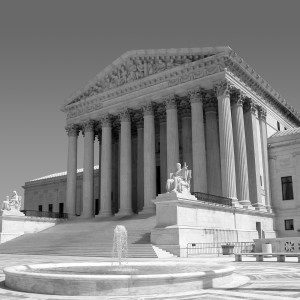Argentina was hit hard by two Supreme Court rulings today.
As predicted last week by a number of our sources, the U.S. Supreme Court has rejected Argentina’s petition to hear an appeal over their battle against holdout bondholders.
Separately, the court ruled bondholders can subpoena banks to determine the country’s ability to pay on its debt.
The Court offered no comment on why they declined to hear the first case, but our sources believe one major influence was the mounting evidence that Argentina would seek to evade the Court’s ruling if it did not get its way. As we reported last week:
The Supreme Court only hears 70 cases per term, explains Richard Samp of the Washington Legal Foundation. If the Cleary memo is seen by the Justices, it raises doubts about whether their ruling would be followed and thus makes it less likely that the certiorari petition will be granted.
Jonathan Macey of Yale Law School believes for the Court to review the case, it would take several Justices who feel very strongly that the District Court ruling was wrong or that the District Court was right and that Argentina would obey a contrary ruling by the Supreme Court. That’s unlikely.
While Argentina told the Court it intended to abide by its decision, a secret memo from Cleary Gottleib, Argentina’s counsel, to its client, advised that the best course of action may be to evade the Court. Last week, sources revealed Argentina was considering payment of the debt in Buenos Aires.
In reality, such a move would not change jurisdiction. Because of Argentina’s poor credit history, they explicitly wrote their debt under New York law and in the jurisdiction of New York courts in order to offer reassurance to those purchasing the debt. If Argentina were to move the debt outside of the U.S. in an attempt to evade the injunctions ordering them to pay, it would be in breach of the country’s contract with its bondholders.
In a phone call today, Macey said the Court’s ruling was good for capital markets, and it demonstrated that U.S. courts would enforce sovereign debt contracts.
Macey also suggested the Cleary memo leak may have been intentional – a negotiation tactic to induce settlement discussions. If that’s the case, it seems to have backfired in several ways. It likely influenced the Supreme Court’s decision to deny cert, and that now leaves the holdouts with the upper hand in any settlement discussions. The next move is Argentina’s, but it has weak footing.
InsideSources has learned that some Members of Congress are watching this issue closely. If Argentina seeks to avoid paying its debt, it is conceivable Congress or the Courts will take action.
When asked about its client’s next steps, a Cleary spokeswoman responded with “no comment.”

